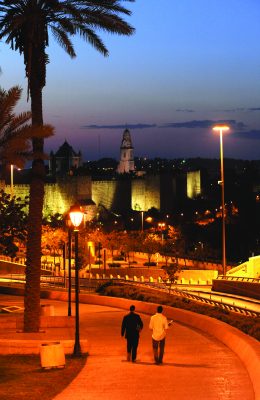×


We have detected your country as:
Please click here to go to the USA website or select another country from the dropdown list.
by: Janet Aslin, Assistant Editor
In the words of King S olomon, “A good name is to be chosen rather than great riches…” (Prov. 22:1). Names represent so much more than just a label by which we identify people, places or things. They bring with them memories, both good and bad; they represent our various roles in the lives of others; they recall our reputations and may even hold a promise of future events.
olomon, “A good name is to be chosen rather than great riches…” (Prov. 22:1). Names represent so much more than just a label by which we identify people, places or things. They bring with them memories, both good and bad; they represent our various roles in the lives of others; they recall our reputations and may even hold a promise of future events.
Did you know that Jerusalem, one of the most ancient cities of the world, has been given 70 names in Scripture? These names are significant as they give us a glimpse of the city through God’s eyes. Let’s examine a few of them.
These names are similar. The “faithful city” includes the Hebrew word aman (אמן) which incorporates the sense of trusting or believing, of standing firm and of being established and steadfast.
In the beginning of his book, Isaiah twice called Jerusalem the faithful city. First he mourned her transition from a city that was filled with righteousness to one that had abandoned her God to serve other gods (Isa. 1:21). Yet the prophet also speaks a word of hope, foretelling of the restoration that will come, saying “you shall be called the city of righteousness, the faithful city” (Isa. 1:26).
The Hebrew word ehmeth (אמת) has as its root, aman. Although primarily translated as “truth,” it also carries the understanding of faithfulness. Consequently, Jerusalem’s name in Zechariah 8:3 has been translated both as the faithful city and the City of Truth. Zechariah speaks of the day when the Lord will return to Jerusalem and it will once again “be called the faithful city” (Zech. 8:3 ESV) or “the City of Truth” (Zech. 8:3 NKJV).
The “City of David” is one of the most frequently used biblical names for Jerusalem, appearing 46 times in the New King James version. The name originated in approximately 1000 BC when King David and his men conquered the seemingly impregnable hillside fortress of the Jebusites by entering the city through a water shaft and surprising its defenders. After that victory, David renamed the city and relocated his capital from Hebron to Jerusalem.
The name of Israel’s beloved shepherd king is still associated with the modern city. Today the “City of David” refers to a specific area in Jerusalem where there is an archaeological park with many rich discoveries connecting the Jewish people to the location.
King Artaxerxes noticed a look of sadness on the face of Nehemiah, his cupbearer, and asked him about it. In his response, Nehemiah called Jerusalem, “the city of my fathers’ tombs” (Neh. 2:5). This name poignantly reminds us that Jerusalem will forever be firmly rooted in the history of the Jewish people—the place on earth where they have buried their ancestors.
Lions abound in Jerusalem. Not real ones, of course, but the lion is the city’s symbol and can be seen on her flag, official insignia, park benches and even on manhole covers! It is nearly impossible to spend time in Jerusalem and be unaware of this biblical name—Ariel (אריאל). It is a compound noun, consisting of the word for lion (ariyeh אריה) and one of the names of God (el אל). We find this in Isaiah 29:1 where we read, “Woe to Ariel, to Ariel, the city where David dwelt!”
Written by the sons of Korah, Psalm 48 offers jubilant praise to God in the city of Jerusalem. The second verse proclaims, “Beautiful in elevation, the joy of the whole earth, is Mount Zion on the sides of the north, the city of the great King” (Ps 48:2). In the book of Lamentations, Jeremiah wrote prophetically of the destruction of the First Temple and reforms the words as a question, “Is this the city that is called…the joy of the whole earth?” (Lam. 2:15). As we consider this name of Jerusalem today, I wonder if any of us would say it is “the joy of the whole earth?” For those who believe the Word of God and His promises, we can be sure that at the time of His choosing, Jerusalem will indeed be the joy of the whole earth.
Although the word is not from the same Hebrew root, in Isaiah 22:2 and 32:13, Jerusalem is also called a “joyous city” (kiriyah aliza קריה עלידה). We catch glimpses of this joy today. Israel’s independence day, Yom Ha Atzmaut, is filled with joyous dancing and singing. The Kotel (Western Wall) is often the scene of joy during bar mitzvah celebrations and other special occasions held throughout the year.
Jerusalem has been called by other names in her history. Before David’s conquest, she was a Jebusite city named Jebus (1 Chron. 11:5). In an attempt to erase any Jewish connection after Titus conquered the city in AD 70, the Romans established a colony on the ruins of Jerusalem and named it Aelia Capitolina. The Arabic name for Jerusalem today is Al Quds. However, those names do not reflect the truth about the city where God has chosen to place His name and to dwell. Jerusalem’s identity has been established for eternity through her biblical names.
Photo Credit: Mark Neyman / Government Press Office
All logos and trademarks in this site are property of their respective owner. All other materials are property of Bridges for Peace. Copyright © 2024.
Website Site Design by J-Town Internet Services Ltd. - Based in Jerusalem and Serving the World.